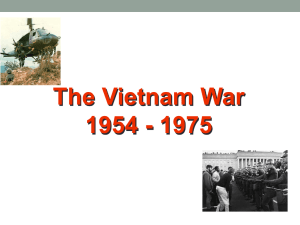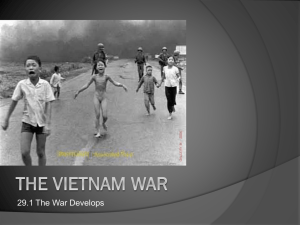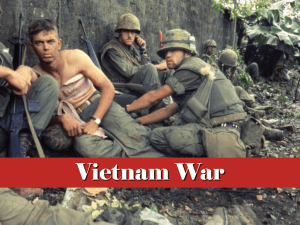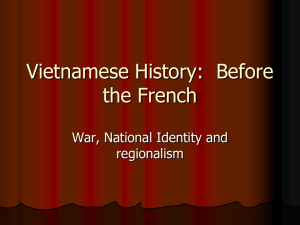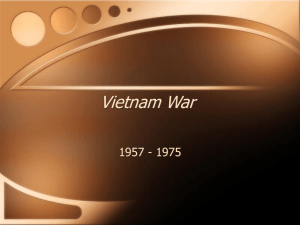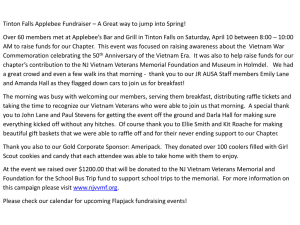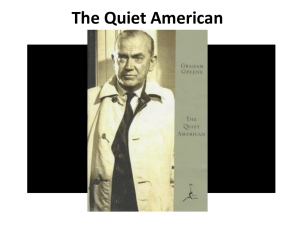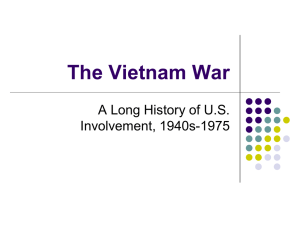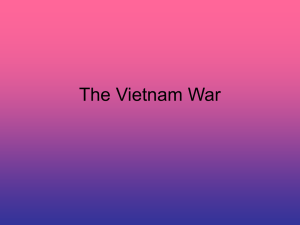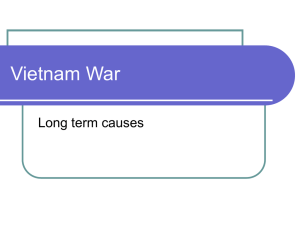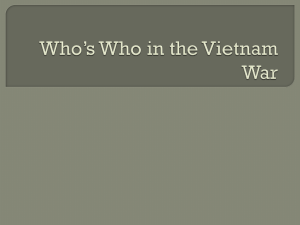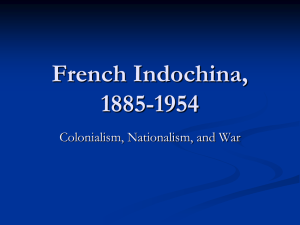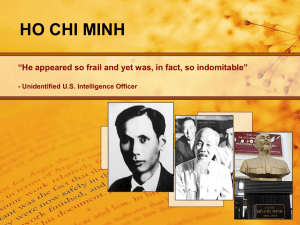Vietnam - spodawg32.net
advertisement
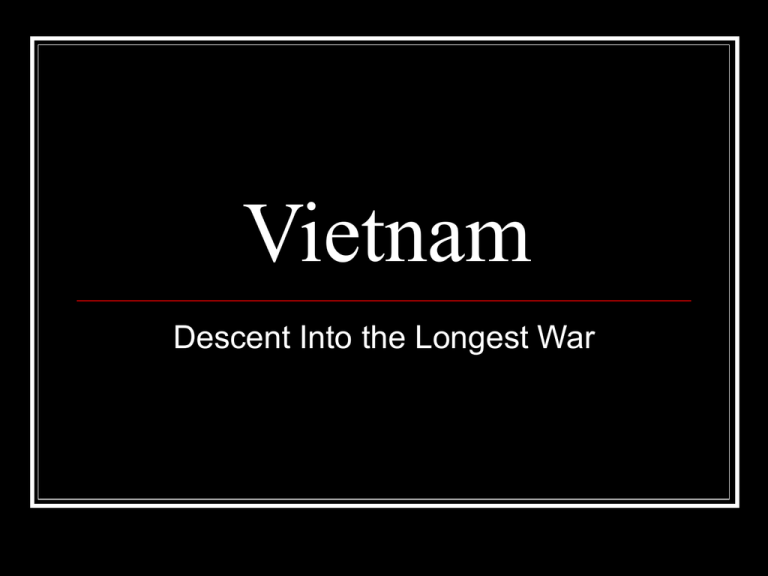
Vietnam Descent Into the Longest War Outline History of Vietnam Beginning of U.S. Involvement The Sides Are Drawn Fighting the War Disadvantages For the American soldier A Little History Who ruled Vietnam until WWII? The French Why? Colonialism: Rice, Rubber, Tin, Tungsten, Teak You Say You Want a Revolution Who took over Vietnam during WWII? The Japanese. During this period, a group of Vietnamese got together to fight the Japanese; to kick out this foreign power, and let Vietnamese rule Vietnam. What was this group called? The Vietminh Uncle Ho 5. Who was its leader? Ho Chi Minh We’re glad he’s on our side! It’s interesting to note that the U.S. worked with Ho to fight the Japanese. And most who worked with him commented on what an exceptional leader he was - hard working, dedicated, absolutely devoted to the notion that Vietnam should not be dominated by an outside force. He was not someone that you wanted as an enemy. Free at last? So after the war, the Japanese are defeated, and Ho Chi Minh is seemingly going to get his wish. Then what happens? The French move back in to reclaim “their” territory. What do the Vietminh do? Start fighting the French. More and more people join them. At this point, Ho believed that the U.S. would actually help him. Why? When in the course of human events Because the U.S. had a tradition of revolutionary activity. They were colonized and dominated by the British, and fought a war for self-determination (the right to rule themselves). He had studied history, and had been deeply influenced by the Declaration of Independence. So he naively assumed that the U.S. would support the Vietminh struggle for independence. “Can you help out, Harry?” He sent a letter to Truman requesting aid. Pretty ironic, huh? So, why did the U.S. decide to aid the French instead? Because he’s a commie rat! France was a strong ally Raw materials. The U.S. decided that if the French were in control, it would make sure that the U.S. had access to the raw materials (rubber, tin, manganese, etc.) Ho Chi Minh was a communist (not a puppet of the Soviet Union, not trying to take over S.E. Asia. But he was a communist, and in our Cold War thinking, that was unacceptable.) So we came in on the side of the French: We recognized the puppet govt they set up, and we began to fund the French war against the Vietminh. By 1954, we had spent 2 billion in Vietnam, 78% of the cost of the French war. Butt Whipping 10. But what happened? The French got their butts kicked. 11. Why? “…People got to be free…” Because people fighting for their freedom usually fight harder than those who are acting to deny freedom. The French were imperialists who were fighting for dominance and economic gain. The Vietminh were fighting to end decades of foreign domination. Can you spell “Dienbienphu”? When did the French finally give up and go home? After a particularly nasty defeat in 1954 at Dienbienphu. They set up an outpost in a wide valley and fortified it with 13,000 troops, hoping to provoke the Vietminh into open battle. The Vietminh responded by amassing 49,000 troops around the valley. Within two months it was all over. Sacre Bleu! Geneva Conference What happened next? There was a peace conference in Geneva, Switzerland: France, U.S., Russia, Britain, China, Laos and both Vietnamese govts - that of Bao Dai, the French puppet, and that of Ho Chi Minh. Both claimed to represent the Vietnamese people Something very significant happened here. What was it? Divided We Fall *Vietnam was divided in two. Did you know that Vietnam was one country until 1954? Winner Take All It was, and here was the deal: these countries agreed that the nation would be split in two, with Bao Dai in power in the South, and Ho in the North. There would be elections in 1956 between these two. The winner would be President of all Vietnam; the country would be re-united. In This Corner Bao Dai Ngo Dinh Diem Ngo Dinh Diem, prime minister of South Vietnam, was able to do away with the monarchy. He held an election in which he mysteriously received 99% of the vote. The Emperor Bao Dai was stripped of all power. Ngo Against Ho So 1956 rolls around. The election is supposed to take place that will determine who will rule a reunited Vietnam. The election will pit Ngo Dinh Diem against Ho Chi Minh. VS So what happened? The election never took place. Why? *Because Ho Chi Minh would have won! He was very popular. He had led the Vietnamese people against imperialist domination. Not A Nice Guy Ngo Dinh Diem, the U.S. choice to replace Bao Dai in the South was very unpopular. ***He was a Catholic in a nation of Buddhists. ***He was corrupt. ***He was dictatorial. Election? What Election? He would have lost, and so when Ho Chi Minh called for elections in ‘56, Diem refused and the U.S. backed him up. The country remained split, and the war was on. Had the Geneva accords been respected, 20 years, billions of dollars, and over two million lives wouldn’t have been spent. Who’s Fighting Who? With the election called off, and Vietnam remaining divided in two, Ho Chi Minh led his followers back to war – this time to get rid of Diem and reunite the country. So who was on each side of the conflict? Who was fighting who? In This Corner North Vietnamese Army (NVA) (Led by Ho) & VS Viet Cong (National Liberation Front – NLF) South Vietnamese Army (ARVN) (Led by Diem) & The United States Uh…..Say That Again The North Vietnamese and the Viet Cong wanted to re-unify the country under Ho Chi Minh. They fought against….. South Vietnamese who we’re loyal to Diem, and the U.S., both of whom wanted Vietnam to remain divided and Ho to stay in the North. Who Are Those Guys? So who were the Viet Cong? South Vietnamese Peasants! The VC were South Vietnamese peasants who didn’t like Diem and wanted the country reunited under Ho Chi Minh. They also the United States gone. But I Thought….. How does this contradict what most people think about the Vietnam War? Well, what is the standard line about why we fought the war? Communist North Vietnam was trying to take over democratic South Vietnam, and we came in to save the day for freedom and democracy. But………. But how can that be true if the Viet Cong were from the south? It means that many people in South Vietnam sided with North Vietnam in the struggle to kick out Diem (and those who would follow him), get rid of the U.S., and make Vietnam one country again. So, really, what kind of war was Vietnam? It was not really a war between two countries, one communist and one democratic, but more accurately, was a civil war between the followers of Ho Chi Minh - who lived in both the north and the south - and Ho’s opponents, who lived in the south and didn’t want to see communism in the whole country. Let me pop the question….. So I’m forced to ask you: If the Viet Cong were from the south. If South Vietnam was not democratic in any way, run by a string of unpopular dictators propped up by the U.S. And if, as the CIA’s own reports claimed, that Ho Chi Minh would have been elected by the Vietnamese with 70% of the vote. What Were We Thinking?! Let Them Eat Cake After ‘56 when Ho leads the NLF against Diem, we give Diem a massive amount of aid which, by the way, he squanders. He and his buds live in palaces while most of the population lives in grass huts. No, Let Them Eat Lead *We send “advisors” so that by 1963 there are 16,700 advisors. I’m not sure what the exact definition of advisors is, but most of them carried guns. “Put Silver Wings Upon My Chest” Even though we supposedly only had advisors in ‘63, I have a friend who was a Green Beret on patrol along the Cambodian border in ‘63, calling in airstrikes against anything that moved. So by 1963, we had: many advisors, some soldiers out in the field, and limited bombing (which started as early as 1961) a major campaign to take villagers out of their villages. To Be Or Not To Be… This was called the “Strategic Hamlet” program. It lasts for quite awhile. Why do you think that we would want to take people out of their villages and move them to new ones, surrounded by barbed wire (sort of like concentration camps)? To isolate them from the Vietcong. Since the VC has much of its support in the villages, we wanted to do away with the villages. So you take them out of this… Or this… And move them into an ugly village with barbed wire and gun towers, far from their rice paddies and much further than they wanted to be from ancestral burial grounds. We turned many villagers who just wanted to be left alone into VC recruits. In the cities, Diem isn’t doing much better. His repression of political opponents and Buddhists caused some monks to burn themselves in protest. This produced some of the most dramatic photos of the war. You Reap What You Sow By this time, late 1963, Diem is so unpopular that the CIA secretly encourages a coup, and he is assassinated by South Vietnamese military guys (taken out of town and shot in the head). Three weeks later….. Hey, Hey, LBJ….. And so Lyndon Baines Johnson is sworn in as president. Saying Good-bye And a shocked nation mourns. LBJ: A tough talkin’ Texan who comes into office boasting that “No raggedyass little 4th rate country like Vietnam is going to push around the United States.” I Just Want To Kick Some Ass! The campaign against Vietnam is progressing, but in 1964, Johnson really wants to turn up the heat - to escalate the war. He wants something to happen that will get the American people firmly behind the war effort, and that will get Congress to give him the green light for escalation. How Could You? And that brings us to what? The Gulf of Tonkin What happened? The N. Vietnamese supposedly launched an “unprovoked” attack on the U.S.S. Maddox. Johnson went on television to tell the American people about this outrageous action. Congress immediately passed the Gulf of Tonkin Resolution Green Light! …authorizing Johnson to “take all necessary measures to repel any armed attack against the forces of the United States and to prevent further aggression”. This is what Johnson wanted. It was not a declaration of war, but it was a blanket of approval for anything that Johnson wanted to do. Bomb, Bomb, Bomb, Bomb Bomb the Nam Massive bombing of North Vietnam began. Heroes or Villains? Only two members of congress stood up to Johnson and voted against the resolution: Wayne Morse of Ernest Gruening of Oregon Alaska AND

